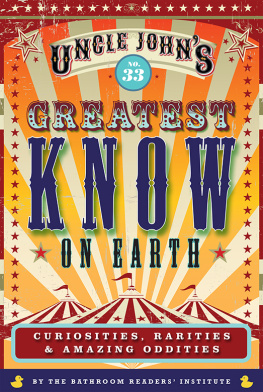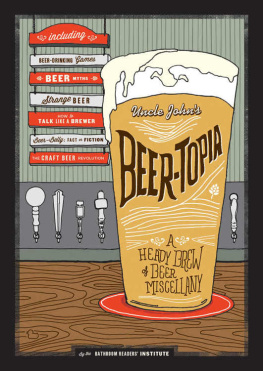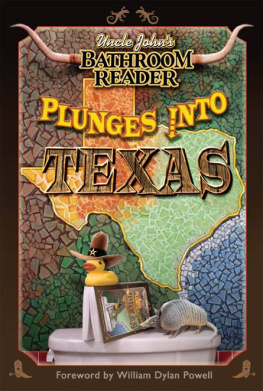
FAST FOOD for THOUGHT
BITE-SIZE MORSELS OF ESSENTIAL
(AND NOT-SO-ESSENTIAL) KNOWLEDGE
by the Knowledge Commons
Ashland, Oregon
INSTANT GENIUS:
FAST FOOD FOR THOUGHT
Copyright 2008 Portable Press
All rights reserved. No part of this publication may be reproduced, distributed, or transmitted in any form or by any means, including photocopying, recording, or other electronic or mechanical methods, without the prior written permission of the publisher, except in the case of brief quotations embodied in critical reviews and certain other noncommercial uses permitted by copyright law.
Portable Press/The Bathroom Readers Institute
An imprint of Printers Row Publishing Group
P.O. Box 1117, Ashland, OR 97520
www.bathroomreader.com
e-mail:
Printers Row Publishing Group is a division of Readerlink Distribution Services, LLC.
The Portable Press, Bathroom Readers Institute, and Uncle Johns Bathroom Reader names and logos are trademarks of Readerlink Distribution Services, LLC.
All correspondence concerning the content of this book should be addressed to Portable Press/The Bathroom Readers Institute, Editorial Department, at the above address.
Cover design by Michael Brunsfeld, San Rafael, CA ()
e-ISBN-13: 978-1-60710-608-1
e-book edition: February 2012
Contents
The editors would like to thank the people whose advice and assistance made this book possible.
Gordon Javna Thom Little Jay Newman Brian Boone John Dollison Amy Miller Kait Fairchild Melinda Allman Julia Papps Michael Brunsfeld Eric Warren Bruce Bayard Jeff Altemus Lorraine Bodger Jeff Cheek Jef Fretwell Judy Plapinger Christine DeGueron Angela Kern Claire Breen Claudia Bauer Dan Mansfield Sydney Stanley JoAnn Padgett Lisa Meyers Amy Ly Ginger Winters Monica Maestas Mary S. Gary Bundzak Duncan McCallum Ralph Hamm (Mr.) Mustard Press Scarab Media Publishers Group West Steven Style Group Raincoast Books Porter the Wonder Dog
Welcome to Instant Genius: Fast Food for Thought. Weve spent the last 16 months digging through magazines, journals, newspapers, encyclopedias, pamphlets, novels, almanacs, comic books, dictionaries, liner notes, baseball programs, racing forms, and even the Internet to find the most extraordinary, the most interesting, the most useful, the most entertaining, and the most mind-boggling information we could possibly gather for this publication.
We love information. We love facts. We love to know thingsthings about people, animals, science, history, how things work, what things do, who said whatwe could go on forever, but here are a few samples:
 There are monkeys in Mexico that apply natural, plant-based perfumes to their bodies.
There are monkeys in Mexico that apply natural, plant-based perfumes to their bodies.
 All the planets in our solar system were once part of a single, spinning, disk-shaped mass of molten pre-planetary goo.
All the planets in our solar system were once part of a single, spinning, disk-shaped mass of molten pre-planetary goo.
 There is a theory that Venus flytraps are extraterrestrial life forms brought here by meteors.
There is a theory that Venus flytraps are extraterrestrial life forms brought here by meteors.
 Albert Einsteins brain was kept in two Mason jars in a small office in Wichita, Kansas, for more than 20 years.
Albert Einsteins brain was kept in two Mason jars in a small office in Wichita, Kansas, for more than 20 years.
Not only that, weve come up with the answers to questions that have haunted us for years, such as:
 Where does outer space begin?
Where does outer space begin?
 Whats the difference between e.g. and i.e.?
Whats the difference between e.g. and i.e.?
 Whats in an atom?
Whats in an atom?
 How do they make tofu? Or paper? Or electricity? Or whiskey?
How do they make tofu? Or paper? Or electricity? Or whiskey?
Why Instant Genius? Because weve taken all those bits of informationsome of them quite large and quite deepand distilled them into easy-to-absorb nuggets that make for an entertaining, thought-provoking reading experience. Then we set up the book in a sort of scroll format, so you can go from one topic to the next, just like you would in real life: You learn something from a great segment on a television show, read something fascinating in a newspaper, hear an amazing story from a friend, encounter an unusual fact from a magazine in the doctors waiting room, and so on. Thats what this book is like24 chapters of random wonders that will leave you wanting more.
With that we invite you to dive into Instant Genius: Fast Food for Thought. Start at the beginning or just open it anywhere, and see what you find. Have fun and get smarteritll only take an instant.
The Editors at the Knowledge Commons
GENIUS: THE WORD
Etymologists believe that the word genius has its roots in the hypothetical progenitor of all Western languages, Proto-Indo-European. Spoken by an unknown people some 5,000 years ago, the language had an oft-used word root: gen (or gn), which meant both to beget and to know. The beget meaning led to words such as pregnant, genesis, generation, genitals, and gender. The know meaning led to words like knowledge, cognition, prognosis, diagnosis, and even genie (as in genie in a bottle).
 The word genius appears to have come from both meanings: It goes back between 2,000 and 3,000 years to a Latin word of the same spelling that referred to a guardian deity, a spirit that watches over each person from the moment of their birth (every man had a genius, every woman a juno). The meaning evolved over the centuries and came to refer to a person who seemed to have an innately (from birth) superior intellect. It made its way from Latin to English circa 1500 with basically the meaning it has today.
The word genius appears to have come from both meanings: It goes back between 2,000 and 3,000 years to a Latin word of the same spelling that referred to a guardian deity, a spirit that watches over each person from the moment of their birth (every man had a genius, every woman a juno). The meaning evolved over the centuries and came to refer to a person who seemed to have an innately (from birth) superior intellect. It made its way from Latin to English circa 1500 with basically the meaning it has today.
 The plural: geniuses is preferred; genii is accepted.
The plural: geniuses is preferred; genii is accepted.
 Genius can be pronounced with two or three syllables: JEEN-yus, or JEE-nee-us.
Genius can be pronounced with two or three syllables: JEEN-yus, or JEE-nee-us.
THEY CALL IT WATERMELON SNOW
If youve ever been high up in a snowy mountain range and come across an expanse of bright, pink snowyou werent seeing things. Its the result of tiny organisms called Chlamydomonas nivalis. Theyre actually a species of green algae, not unlike the algae on a ponds surfaceexcept this kind is cold-loving algae (nivalis refers to snow in Latin). These tiny, single-celled organisms go dormant in snow through the winter, then during the spring they germinate (meaning they awake from this dormant period). Once germinated, they use their whiplike tails to propel themselves to the surface, where they feed on leaves and other organic matter. C. nivalis protects itself from the harsh light in snowy conditions by secreting and covering itself with a gelatinous substance; sunlight causes that coating to turn a pinkish color (similar to the color of watermelon), causing the snow to turn that color, too. Want to eat the watermelon snow? Its not advised: Many alpine hikers claim it causes diarrhea (and doesnt taste at all like watermelon).
LITTLE LEAGUE BASEBALLS DIVISIONS
As defined by Little League International:
Next page











 There are monkeys in Mexico that apply natural, plant-based perfumes to their bodies.
There are monkeys in Mexico that apply natural, plant-based perfumes to their bodies.